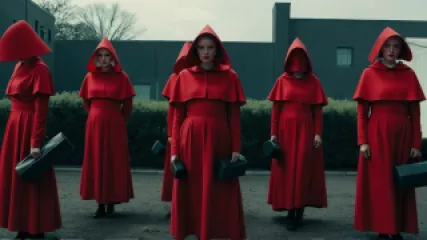Insights from 'The Handmaid's Tale': Challenging Gender Roles in Society
Insights from 'The Handmaid's Tale': Challenging Gender Roles in Society
In Margaret Atwood's dystopian novel 'The Handmaid's Tale', the fictional society of Gilead presents a chilling depiction of a world where traditional gender roles have been rigidly enforced and individual freedoms have been severely restricted. As we navigate the complex and often contentious landscape of gender roles in our own society, there is much we can learn from the cautionary tale that unfolds within the pages of this acclaimed work of literature.
The Handmaid's Tale: A Cautionary Tale of Gender Oppression
At the heart of 'The Handmaid's Tale' is the story of Offred, a woman forced to serve as a 'Handmaid' in the totalitarian regime of Gilead. In this nightmare world, women have been stripped of their rights and autonomy, reduced to their biological function as reproductive vessels for the ruling class. Offred's narrative, told in a first-person perspective, offers a chilling glimpse into the daily realities of life under such a system, where gender-based discrimination and oppression are the norms.
Gilead's social structure is built upon a rigid, binary understanding of gender roles, where men are assigned the role of 'Commanders' and women are categorized into various subservient classes, such as 'Wives,' 'Marthas,' and 'Handmaids.' This strict gender-based hierarchical system not only deprives women of their basic human rights but also actively seeks to erase their individuality and autonomy.
Challenging the Narrative: Redefining Gender Roles in Society
As we examine the dynamics of gender roles portrayed in 'The Handmaid's Tale,' it becomes clear that the novel serves as a powerful critique of the harmful consequences of a society that rigidly enforces traditional gender norms. By providing a window into the lived experiences of those oppressed by such a system, Atwood's work invites us to reflect on the ways in which our own society grapples with issues of gender equality, gender-based discrimination, and the societal pressures that shape our understanding of masculinity and femininity.
One of the key lessons we can take from 'The Handmaid's Tale' is the importance of challenging the narrative and redefining the boundaries of acceptable gender roles. In Gilead, the characters' resistance to the imposed gender norms, despite the severe punishments they face, serves as a testament to the human spirit's resilience and the inherent need for self-determination.
Gender Socialization and the Perpetuation of Harmful Stereotypes
The novel also sheds light on the role of gender socialization in the perpetuation of harmful gender stereotypes and expectations. In Gilead, the strict division of labor and the rigidly defined social roles for men and women are not only enforced by the ruling regime but also deeply internalized by the characters themselves. This process of gender socialization, whereby individuals learn and internalize societal norms and expectations related to their gender, is a crucial factor in understanding the dynamics of gender roles in our own society.
Throughout the novel, we witness the ways in which gender socialization shapes the characters' perceptions of themselves and others, from the Handmaids' internalized feelings of shame and powerlessness to the Commanders' sense of entitlement and authority. This exploration of gender socialization serves as a powerful reminder that the attitudes and behaviors we consider 'natural' or 'inherent' to a particular gender are often the result of societal conditioning rather than innate characteristics.
Challenging Gender Expectations and Fostering Equity
As we reflect on the lessons of 'The Handmaid's Tale,' it is clear that the novel calls for a fundamental rethinking of the ways in which we conceptualize and approach gender roles in our own society. By challenging the rigid gender binary and the oppressive structures that maintain it, we can work towards a more equitable and inclusive world where individuals are free to express their gender identity and fulfill their potential without being constrained by societal expectations.
This process of challenging gender expectations and fostering equity involves a multifaceted approach, including:
- Critically examining the social, cultural, and political factors that shape our understanding of gender
- Dismantling harmful gender stereotypes and promoting diverse representations of masculinity and femininity
- Advocating for policies and institutions that protect the rights and freedoms of individuals regardless of their gender identity
- Empowering individuals to embrace their unique gender expression and resist societal pressures to conform to narrow gender norms
Embracing Gender Diversity and Inclusion
By drawing inspiration from the cautionary tale of 'The Handmaid's Tale,' we can work towards a future where gender diversity and inclusion are not only recognized but actively celebrated. This involves acknowledging the complex and multifaceted nature of gender, moving beyond the traditional binary model, and creating spaces where individuals can explore and express their gender identity without fear of discrimination or oppression.
Central to this endeavor is the recognition that gender is not a fixed or immutable characteristic, but rather a fluid, dynamic, and deeply personal aspect of human identity. By embracing this understanding, we can challenge the rigid gender norms that have long been the foundation of our societal structures and work towards a more inclusive and equitable world.
Conclusion: Harnessing the Power of Literature to Inspire Change
In the end, the enduring legacy of 'The Handmaid's Tale' lies in its ability to inspire critical reflection and catalyze meaningful change. By using the novel as a lens through which to examine the complex and often contentious issues surrounding gender roles in society, we can gain valuable insights and translate them into concrete actions that promote gender equity, challenge harmful stereotypes, and empower individuals to embrace their unique gender identities.
As we navigate the ongoing discourse surrounding gender roles, it is essential that we draw upon the wisdom and the cautionary tale that Atwood has so skillfully woven into the fabric of 'The Handmaid's Tale.' By doing so, we can harness the power of literature to inspire a more just, equitable, and inclusive society - one that celebrates the diversity of human experience and empowers all individuals to live freely and authentically.






